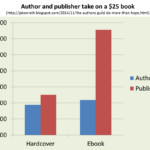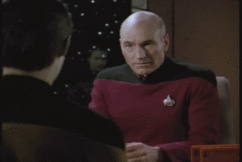 The Authors Guild has, many times in the past, voiced that ebook royalties should be raised. So do something about it.
The Authors Guild has, many times in the past, voiced that ebook royalties should be raised. So do something about it.
The AG, and Authors United, have been able to get beaucoup media attention during the Hachette/Amazon spat … Now the AG, and all of the bestselling authors who supported AU, need to show some backbone and integrity and use the same tactics to force the Big 5 to raise digital royalties …
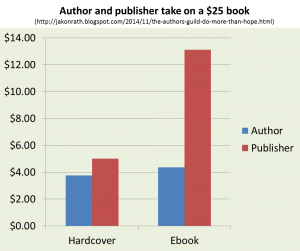
Konrath’s numbers, my chart
On a $25 hardcover, the author makes about $3.75, and the publisher around $5, after all production, delivery, and middleman costs (distributors and booksellers). On a $25 ebook, an author makes $4.37, and the publisher $13.12. How did this happen? Where was the outrage when this was slipped into all major publishing contracts? …
I won’t point fingers, but a Google or Twitter search will show how many authors seem to think Amazon is bad, the agency model is good, and the poor Big 6 are getting the shaft. Uh, no. That’s just plain wrong. I’m going to explain why the agency model in this particular case is indeed bad for authors …
Under the prior [wholesale] model, Amazon bought ebooks at a percentage of the recommended retail price. Then they priced them how they saw fit. The wholesale price for ebooks was often about half of the hardcover price. So a $25 recommended retail price meant Amazon paid $12.50 for the ebook. According to most contracts, the author made 25% of the net price the publisher received. So at the above numbers, an author would make $3.12 NO MATTER WHAT PRICE AMAZON SOLD THE EBOOK FOR.
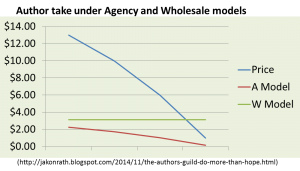
Konrath’s numbers, my chart
In other words, if Amazon wanted to sell the ebook for $9.99, the author still makes $3.12. Sell it for $5.99? Author makes $3.12. Sell it for 99 cents? Author makes $3.12.
So what happens when the agency model comes into play? First of all, Amazon no longer controls the price … Amazon works its butt off trying to keep prices low. That’s why so many people shop there.
With the wholesale model, authors made more money per unit and sold more units. Funny thing is, publishers also made more money under the wholesale model. But instead the Big 6 decided they wanted an agency model. Authors still get 25% of net. But net has gotten lower in almost all cases.
With the wholesale model, net was $12.50. With the agency model, net is 17.5% of the list price set by the publisher. So the publisher sells it for $12.99, the author makes $2.27. Sell it for $9.99? Author makes $1.74. Sell it for $5.99? Author makes $1.04. Sell it for 99 cents? Author makes 17 cents.
 Sure, the NFL is in no danger of going broke. But, its viewership has been dipping lately, slumping a few percentage points each year. The folks running the league seem to have recognized the problem, and are trying … well .. things. Things like letting players who are not good enough for the regular league play in the so-called FXFL.
Sure, the NFL is in no danger of going broke. But, its viewership has been dipping lately, slumping a few percentage points each year. The folks running the league seem to have recognized the problem, and are trying … well .. things. Things like letting players who are not good enough for the regular league play in the so-called FXFL.

 This might sound a little weird from a guy who bought a projector TV so his home experience would match his cinema experience as closely as possible, but I still think there is a huge difference between a movie to see in the theater and a movie to wait to see at home.
This might sound a little weird from a guy who bought a projector TV so his home experience would match his cinema experience as closely as possible, but I still think there is a huge difference between a movie to see in the theater and a movie to wait to see at home. Once upon a time a man said “women in stories shouldn’t need a man to rescue them!” To prove his point, he wrote a story to rescue women from stories in which women needed men to rescue them.
Once upon a time a man said “women in stories shouldn’t need a man to rescue them!” To prove his point, he wrote a story to rescue women from stories in which women needed men to rescue them.

 In chapter 120 of the Chinese classic, Wen-Tzu’s Book of Pervading Mystery (
In chapter 120 of the Chinese classic, Wen-Tzu’s Book of Pervading Mystery (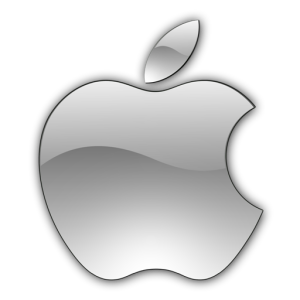 From the New York Times:
From the New York Times:
 Michael Bourne at The Millions takes on the egalitarian myth behind teaching the craft of writing:
Michael Bourne at The Millions takes on the egalitarian myth behind teaching the craft of writing: